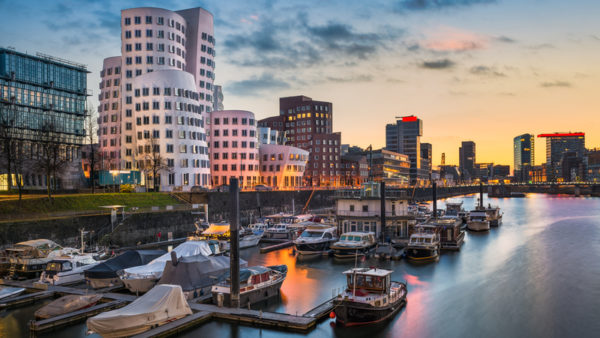Depressed oil prices, lowest-cost tendering and chronic cashflow problems are putting millions of construction workers at risk in the Gulf. But against the grain of industry and government apathy, a handful of contractors, including Multiplex, are trying to drive up labour standards.
Hundreds of migrant construction workers went on strike in Qatar this month over non-payment of wages, risking police crackdowns in a country that forbids any organised labour activity.
Amid hostile international scrutiny, the sultanate has been trying to manage its reputation as it prepares to host the FIFA 2022 World Cup, announcing a series of labour reforms, and even winning praise for them from workers’ rights groups.
But as the strikes this month show, abuse is still rife and anger amongst desperate workers has reached boiling point.
- See Trapped in Qatar, an undercover investigation showing the plight of migrant construction workers in the sultanate
The World Cup put Qatar in the spotlight, but with $3 trillion worth of projects planned or underway across the six Gulf Cooperation Council (GCC) countries, the entire region remains a powerful magnet for migrant workers, with an estimated 10 million now employed, mostly from South and Southeast Asia, and Africa.
The majority arrive deep in debt, having paid exorbitant recruitment fees to middle men. Once in country, various kafala systems of employer sponsorship increase their vulnerability, forbidding them to change jobs or leave the country without their employer’s permission.
The Business and Human Rights Resource Centre (BHRRC), an NGO, recorded 17 public allegations of labour rights abuse by construction companies in the Gulf between 2017 and 2018, impacting more than 12,000 workers (PDF). BHRRC said that 71% of the allegations related to non payment of workers’ wages, whilst 76% covered restriction of movement, such as withholding passports, or allowing visas to expire.
Mariam Bhacker, a former senior project manager with BHRRC, said that this number was probably "the tip of the iceberg" due to difficulties in accessing information about the region.
Economic pressures
Many of the workers’ problems are fuelled by payment issues within supply chains. As law firm DLA Piper’s 2018 report Time for Change noted, plunging oil prices are causing clients to cancel, delay or redesign projects, forcing contractors to accept discounts. The report found that delays in payments in Saudi Arabia, Oman, Qatar and the UAE were affecting contractor cashflow, forcing thousands of layoffs. It highlighted a rising trend of disputes in GCC countries.
Companies that are performing well on labour standards could be priced out of the market completely– Mariam Bhacker, BHRRC
Another NGO, Migrant Rights, recently highlighted the effects that this hostile economic climate can have on workers, documenting the plight of 1,200 migrants employed as labourers, carpenters and steel fixers for HKH Contracting Co.
The company had worked for several prestigious clients including Qatar Petroleum, Al Jazeera and Sheraton Hotels. But when it got into financial difficulties, workers were left starving in a camp in Qatar without running water or electricity and facing eviction from the camp landlords. Some had not received wages for a full year, but had continued to work in the desperate hope that money would turn up.
Qatar, which has a three year agreement with the International Labour Organisation (ILO), has introduced a range of measures to protect workers from such treatment, and has partially reformed its kafala requirements. But Migrant Rights says that the country’s Wage Protection System failed to adequately protect the HKH workers by missing years of salary delay and non payment.
Such instances can only add to the discomfort of multinationals operating in the region. Under increasing scrutiny from NGOs and pension funds, and bound by stricter domestic legislation such as the UK’s Modern Slavery Act, or the French Duty of Vigilance law, which requires companies to be more accountable for their supply chains, contractors face increasing reputational as well as financial risk. High profile exits from the Gulf in recent years include Balfour Beatty and South Africa’s Murray and Roberts.
A few good companies
For multinationals that continue to do business in the Gulf, including Kier, Bam and Interserve, assessing labour standards remains a challenge. BHRRC has conducted two surveys of companies in Qatar and the United Arab Emirates, first in 2016, then in 2018. Seeing low engagement and little evidence of change over this period, it has criticised the majority of organisations for "unacceptable lack of transparency and engagement on migrant workers’ rights".
However, BHRRC has identified a handful of companies that are proactively improving labour standards in their supply chains. Vinci, operating in Qatar as QDVC, Multiplex, Laing O’Rourke and Italian company Salini Impregilo, were highlighted as showing leadership that "went beyond compliance or policy statements".
"We’re seeing that the better performing companies really communicate what they’re doing. They don’t just have a standalone human rights team. They’re looking at this very operationally, via procurement and human resources departments," Bhacker says.
Stephen Smith, executive director for safety, health, environment and quality for Multiplex in Europe, the Middle East and Canada, says that his company is "constantly building capacity within our supply chain leadership teams to help them understand worker vulnerabilities and the business case for investing in eliminating them".
Widening gap
But NGOs complain that the Gulf’s public procurement processes work against this approach. In GCC countries, government bodies are legally required to award contracts to the lowest cost bidder. Prequalification focuses on a company’s track record of delivery rather than health, safety and environmental performance. Foreign players complain of being undercut by local competitors that ignore international standards.
Smith says that worker welfare is still a misunderstood topic, which he calls a "major challenge" for the industry.
"Extreme cashflow pressures throughout the market make it difficult to gain momentum with the supply chain. The true value of human rights and worker welfare programmes needs to be accounted for when projects are being tendered," he adds.
Bhacker is concerned about a widening the gap between companies that proactively improve worker conditions and those that barely comply.
"Companies that are performing well on labour standards could be priced out of the market completely," she warns.
A group of companies called "Building Responsibly", whose membership includes Vinci, Multiplex, Bechtel, Fluor and Jacobs, is developing tools to help companies raise standards for workers in the region. But Jill Wells, programme officer at Engineers Against Poverty, says any industry initiatives should involve clients, particularly governments.
"The most positive developments that we’re seeing in the region have come from government clients," she says.
Regarding efforts being made to stamp out worker recruitment fees, Wells urges industry to prioritise fair and timely payment to the entire workforce as a means of reducing hardship in supply chains.
"The difficulties of stopping recruitment fees are enormous. The most important thing is to make sure workers get paid. Even those that haven’t paid recruitment fees still need to be paid on time," she adds.
Case study: How Multiplex handles worker welfare in the Gulf
Stephen Smith, Multiplex’s executive director for safety, health, environment and quality, explains his company’s worker welfare strategy.
On procurement: Multiplex embeds worker welfare performance in its prequalification process, asking subcontractors to supply evidence of responsible behaviour. This includes asking for details of leadership engagement, timesheets and payslips, accommodation inspection scores, audit scores, participation in worker representative meetings, and performance in handling grievances.
The answers are used to compile a risk register that determines the level of operational scrutiny that will be placed on each subcontractor.
Smith says Multiplex tries to avoid high-risk subcontractors. "We understand this is a complex issue so we focus our attention on finding subcontractors that demonstrate the right behaviours and leadership attributes. Wherever possible, we also help subcontractors to build their capacity and find workable solutions that focus on the protection of the workforce."
On interventions: Multiplex has an ‘Early Warning Indicator’ system to detect if wages are being paid late and, if they are, the issue is escalated to senior management.
"When we see evidence of late payment of wages, this can be a red flag of potential cash flow issues and the business may need assistance or support," Smith says, adding that Multiplex will call the subcontractor to a meeting.
"We’ll ask how they are addressing the issue and whether we can help. Our primary focus is on protecting the workers. For repeated instances, we take a more direct line of questioning and carry out an investigation to determine next steps."
On terminating supplier contracts: Smith says that terminating contracts is the "absolute last option" for the company, which is focusing instead on raising standards. "Usually we carry out interventions where we bring in the subcontractor’s leadership team and offer expertise or guidance. Wherever possible, we also support contractors that have short-term cash flow issues, helping get them back on track to pay their workers and complete the project."
Image: Migrant workers in West Bay, Doha, Qatar (Alex Sergeev/www.asergeev.com/CC-BY-SA-3.0)Â
Further reading:
Strikes in Qatar: Foreign workers break law to protest over withheld wages










